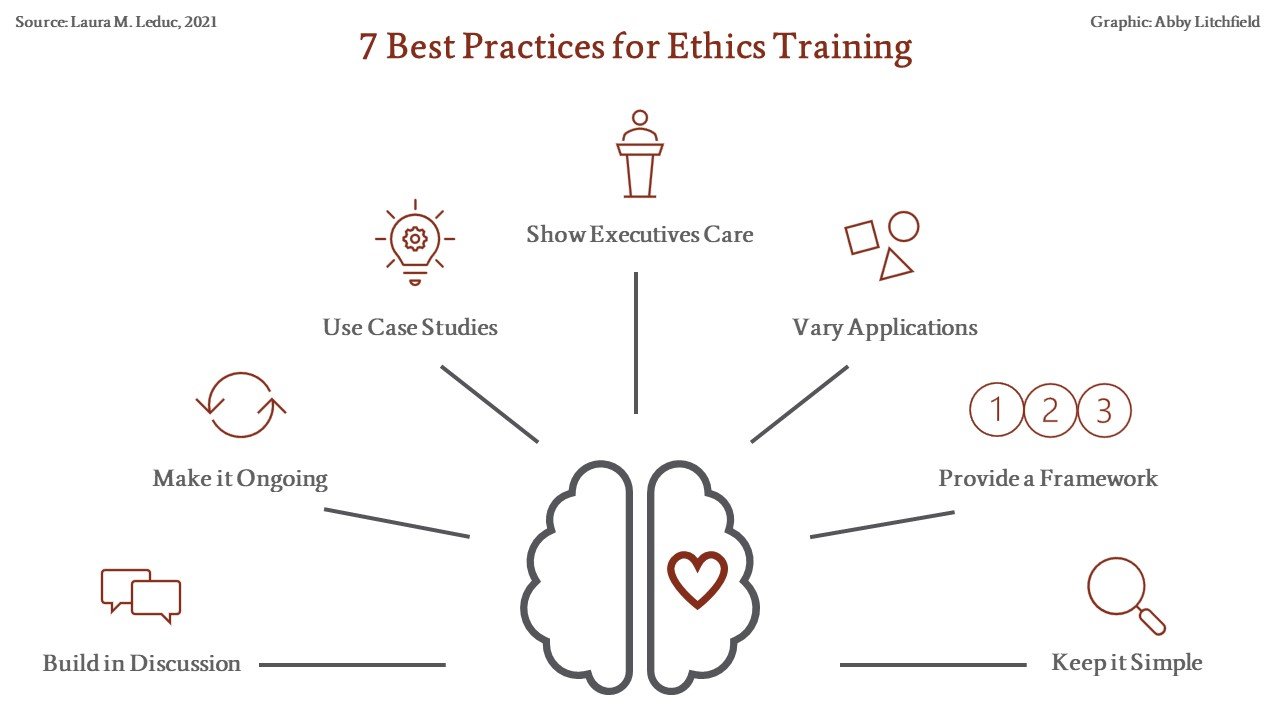How can ethics training in organizations have greatest positive impact? Draw on 7 best practices and 8 key questions.
Dr. Laura Parks-Leduc is a Professor of Management at James Madison University.
Ethics training for organizations is gaining in popularity. But while I think many of us would acknowledge the importance of ethics, it turns out it’s really difficult to teach ethical decision making in a way that has a positive impact.
Research on ethics training programs finds that many produce no results. Although some do have a positive impact, it’s often a small one.
But the answer isn’t to stop ethics training. Done effectively, ethics training can provide our employees with an important skill set that can keep both them and organizations out of trouble. In an increasingly complex world, that has never been more important.
The good news is that the research on ethics training programs does point to some clear best practices. In this article, I’ll describe them and how they can help your organization stay on an ethical path.
What Are Business Ethics?
Ethics is the study of what is considered to be right or wrong, or good or bad, by individuals and groups in society. Ethics training is designed to teach people how to make decisions in situations where there is an ethical component: situations in which some decisions, behaviors, or outcomes could be evaluated as right or wrong, or good or bad. Some examples would include:
A salesperson provides false or misleading information about a product in order to close a deal.
A manager decides to engage in “creative” accounting in order to make the company’s financial position look better.
A top management team of a corporation chooses to dump the company’s environmental waste on the property (or worse, in the local river) rather than paying for proper storage and/or mitigation.
In each of these situations, an outside observer would evaluate these behaviors as wrong, because they violate relevant social standards of behavior, cause harm, or in some way damage another individual or group.
Why Ethics and Ethics Training Are Difficult
Ethics training is complicated because in many situations, a particular decision, behavior, or outcome leads to good results for some individuals, and bad results for others.
For example, the manager who falsifies the financial records may receive a larger year-end bonus because the company appears to be doing well. This outcome is good for the manager, but could harm the company and its owners.
In the case of environmental waste, the decision benefits the company by saving money…but hurts the environment and local community members.
Given these mixed outcomes, individuals and organizations must decide how to prioritize options when there is no single outcome that is equally beneficial for all involved parties.
We encounter this kind of decision-making all the time in our personal lives. Maybe we choose a restaurant for dinner (or plan a vacation, or select a movie to see), when family members or friends have conflicting preferences. But these decisions can be even more challenging in work situations, when the opportunities for gain (and risks of loss) can be substantial. We must prepare our employees for the challenge of behaving ethically when there is potentially so much is at stake.
Seven Best Practices for Ethics Training

Here’s what research shows is effective:
Build in discussion. Some training is self-guided, where employees complete it at their own pace and often individually. This can be useful for some types of learning: for example, a technical program. But with ethics training, you’ll get better results if your employees are discussing their perspectives with one another and with an instructor.
Discussion is helpful because different people tend to have different perspectives on the situation. Hearing from people who approach a problem differently encourages both deeper thinking and perspective-taking. When people think about a situation from different perspectives, they can become more sensitive to how their decisions or behaviors might affect another individual or group.
2. Make it ongoing. Shorter training programs spread out over time are generally more effective than one longer training. You might want to consider a monthly “ethics discussion” hour in place of a one-day training session. The repeated exposure reminds participants of the topic’s importance and relevance. If you discuss it once and then never again, it can be easy to dismiss the training content as irrelevant to daily work lives.
3. Use case-based, applied activities. Avoid abstract lectures. Consider bringing up actual ethical dilemmas that the organization (or industry) is facing or could face, so that the ethics discussion is grounded in employees’ lives and shared experiences. Then, talk about ways to address the situation and the ethical implications of the different approaches. This enables participants to work through possible ethical dilemmas before they experience them. Ideally, this should be an open discussion of ideas, not the instructor telling the participants what to do.
4. Vary the applications. As part of the training, let employees practice their ethical reasoning skills in different contexts and situations. A variety of different cases can help participants develop their reasoning skills.
5. Show that executives care. Concern for ethical behavior and ethical decision making needs to be a priority among an organization’s senior leaders. They need to talk about ethics, address ethical concerns, and model appropriate ethical behavior for others in the organization. Research shows that the “tone at the top” really does influence behavior at lower levels of the organization. The culture of your organization can have a tremendous impact on behavior, for better or for worse.
6. Provide a framework. Give participants a simple, easy-to-understand framework that they can use consistently. This could be a simple mantra, like “don’t do anything that would make you or the organization look bad if it ended up on the front page of the newspaper.” Or you could reference your organization’s values, and stress the importance of making decisions consistent with those values.
7. Prioritize simplicity over philosophy. Traditional ethics courses tend to include a deep dive into the various philosophical approaches to ethics, with discussions about the differences between utilitarianism vs. virtue ethics, for example. I’m of the opinion that spending a lot of time talking about all the different moral philosophies is a mistake if your goal is application. They tend to become overwhelming, and people lose interest before you get to the interesting part, which is how you might apply them in real situations. They can also feel obscure and disconnected from reality. Keep it simple!
Eight Key Questions: A Framework for Ethical Reasoning
At my institution, James Madison University, we try to apply many of these best practices to develop the ethical reasoning skills of our students. We even developed a shared framework that is used across the university, the Eight Key Questions (8 KQs).
These questions were developed by faculty from the various moral philosophies, but using straightforward language that’s easy to understand and connects to daily life. While developed for students at JMU, the 8KQs framework also works in other settings. It can be used as is, or serve as a model for organizations trying to develop their own framework.
To apply the framework, we encourage students to ask themselves the 8 KQs when they are in a situation with ethical implications. This encourages students to reflect, rather than simply react– which should lead to better decision making. Each of the 8 KQs is also identifiable by a single word, to help recall.
The 8KQs are:
Fairness – How can I act equitably and balance legitimate interests?
Outcomes – What achieves the best short- and long-term outcomes for me and all others?
Responsibilities – What duties and/or obligations apply? What is my responsibility to my boss? My organization? My customers? My colleagues/employees? The environment? Society?
Character – What actions best reflects who I am and the person I want to become?
Liberty – How does respect for freedom, personal autonomy, or consent apply?
Empathy – What would I do if I cared deeply about those involved?
Authority – What do legitimate authorities (e.g., experts, law, my religion/god) expect of me?
Rights – What rights (e.g., innate, legal, social) apply?
Our research suggests that this effort is working; a survey of graduating seniors found that those with more exposure to the 8 KQs also responded more ethically to scenarios.
Still, ethics aren’t simple. We tell students that not all of the eight questions will be relevant in a given scenario, and that often they will conflict. Some questions will suggest one course of action, while other questions will suggest a different response.
This is, of course, the nature of ethical dilemmas. If there were one optimal solution that made everyone happy, it wouldn’t be a dilemma. But having training and tools to guide thinking can ensure that people think through all the possibilities, and that they can defend the choice that they are making as the best possible option given the situation.
Ethics Can Make a Difference in the Workplace
One bright point in the research is that ethics training in organizations tends to be more effective than ethics training at universities. It’s not entirely clear why, but ethics training within an organization is probably more targeted and concrete. Providing training that is relevant to a particular workplace is easier than training that aims to help students navigate many possible future situations.
Also, I believe that employees, for the most part, want guidance on how we want them to behave and what factors we want them to use to guide their decision making. They want to do their jobs well! We just need to provide clear expectations. But if we provide strong ethics training, we can have a positive impact on our employees, our organizations, and the world.
About the Author
Dr. Laura Parks-Leduc is a Professor of Management at James Madison University in Harrisonburg, Virginia. She earned her PhD in management from the University of Iowa. She conducts research primarily on the characteristics of individuals that influence their behavior, motivation, and decision making. Dr. Leduc’s work has been published in a wide range of journals, including the Annual Review of Psychology, Personnel Psychology, and Personality and Social Psychology Review.
Dr. Parks-Leduc is originally from Florida, but has also lived in South Carolina, France, California, and Iowa. In her free time, she enjoys hiking, gardening, and wine tasting.


Add a Comment
This site uses User Verification plugin to reduce spam. See how your comment data is processed.This site uses User Verification plugin to reduce spam. See how your comment data is processed.